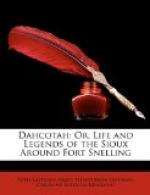Fiery Wind was the nephew of Good Road, but he, like the sons, was in disgrace with the chief, and, like them, he had vowed vengeance against “Old Bets.”
CHAPTER III.
The gun is now generally used among the Dahcotahs as a weapon of warfare. But those bands in the neighborhood of Fort Snelling considered it as a necessary part of their war implements, before the distant bands were at all acquainted with its use.
Some time ago, one of the Mun-da-wa-kan-tons gave a gun to a Sisse-ton, who, proud of the gift, went out immediately to use it. On his return to his village he came up with a drove of buffaloes. His first impulse was to use his bow and arrow, but a moment’s thought reminded him of the gift of his friend. He loaded the gun, saying at the same time to it, “Now, the Dahcotahs call you ‘wah-kun’ (supernatural), kill me the fattest cow in the drove.” He waited a few moments to see his orders executed, but the gun was not “wah-kun” enough to fire by order alone. Seeing that it did not go off, the Sisse-ton flew into a rage and broke the gun into pieces. “I suppose,” said he “that if a Mun-da-wah-can-ton had told you to kill a buffalo, you would have done it, but you do not regard what a Sisse-ton says.” So he threw the pieces of the gun away, and found his bow and arrows of far more service.
However naturally the usages of warfare may come to the Indians, they are also made a part of their education.
The children are taught that it is wicked to murder without a cause; but when offence has been given, they are in duty bound to retaliate.
The day after the return of Fiery Wind, the boys of the village were to attack a hornet’s nest. This is one of the ways of training their sons to warfare. One of the old warriors had seen a hornet’s nest in the woods, and he returned to the village, and with the chief assembled all the boys in the village. The chief ordered the boys to take off all their clothes, and gave them each a gun. He then told them how brave their forefathers were—that they never feared pain or danger—and that they must prove themselves worthy sons of such ancestors. “One of these days you will be men, and then you will go on war parties and kill your enemies, and then you will be fit to join in the dog feast. Be brave, and do not fear the sting of the hornet, for if you do, you will be cowards instead of warriors, and the braves will call you women and laugh at you.”
This was enough to animate the courage of the boys—some of them not more than five years old pushed ahead of their elder brothers, eager to show to their fathers, who accompanied them, how little they feared their enemies, as they termed the hornets. And formidable enemies they were too—for many of the little fellows returned sadly stung, with swollen limbs, and closed eyes; but they bore their wounds as well as brave men would have endured their pain on a battle-field.




